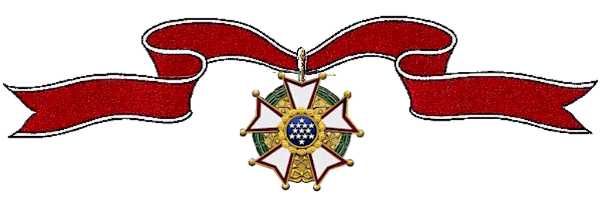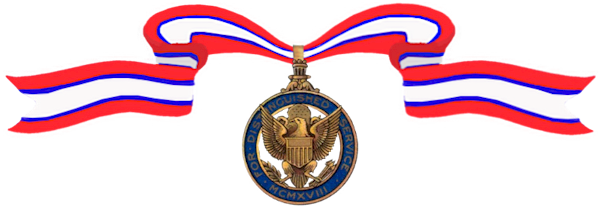(Citation Needed) – SYNOPSIS: The President of the United States of America, authorized by Act of Congress, 20 July 1942, takes pleasure in presenting the Legion of Merit to Colonel (Infantry) Alexander Russell Bolling, Jr. (ASN: 0-26066), United States Army, for exceptionally meritorious conduct in the performance of outstanding services to the Government of the United States with U.S. Army Vietnam in the Republic of Vietnam from 1962 to 1963. The singularly distinctive accomplishments of Colonel Bolling and his dedicated contributions in the service of his country reflect the highest credit upon himself and the United States Army.

Awards Received
-

Legion of Merit
-

Army Distinguished Service Medal
-

Silver Star
-

Legion of Merit
-

Legion of Merit
-

Silver Star
-

Silver Star
-

Prisoner of War Medal
-

Army Distinguished Service Medal
-
Legion of Merit
Service:
United States ArmyRank:
Major GeneralAction Date:
January 25, 1971 – May 25, 1972
The President of the United States of America, authorized by Act of Congress, 20 July 1942, takes pleasure in presenting a Third Bronze Oak Leaf Cluster in lieu of a Fourth Award of the Legion of Merit to Major General Alexander Russell Bolling, Jr. (ASN: 0-26066), United States Army, for exceptionally meritorious conduct in the performance of outstanding services to the Government of the United States while serving as Commanding General, United States Training Center, Infantry and Fort Lewis, Fort Lewis, Washington, during the period 25 January 1971 to 25 May 1972. General Bolling’s exceptional ability as a military leader, administrator, planner, and organizer has been of immeasurable value to the United States Army during a period characterized by a major reorganization of forces and realignment of objectives, a drawdown of the strength of the United States Army at Fort Lewis and special training programs. His many accomplishments and innovations have significantly improved all areas under his command. General Bolling’s most capable direction, initiative, executive ability, perseverance, and humaneness in the face of many complex and divergent problems involving the military and outside influences were most noteworthy. He established and maintained an available rapport with the surrounding civilian communities, contributing immeasurably to the United States Army image. Major General Bolling’s performance reflects an acumen of great depth, a tremendous pride in the soldier, and a dedication that are in keeping in the finest traditions of the military service.
-
Army Distinguished Service Medal
Service:
United States ArmyRank:
Brigadier General [then Colonel (Infantry)]Regiment:
Infantry BrigadeDivision:
XXIV CorpsAction Date:
February 1968 – July 1969
United States Military Academy Register of GraduatesThe President of the United States of America, authorized by Act of Congress July 9, 1918, takes pleasure in presenting the Army Distinguished Service Medal to Brigadier General [then Colonel (Infantry)] Alexander Russell Bolling, Jr. (ASN: 0-26066), United States Army, for exceptionally meritorious and distinguished service in a position of great responsibility to the Government of the United States from February 1968 to July 1969 while assigned as Commanding Officer, 3d Brigade, 82d Airborne Division, and as Chief of Staff, XXIV Corps. Two days after his brigade was alerted to deploy to the Republic of Vietnam to reinforce United States forces in the beleaguered Northern I Corps Tactical Zone, following the communist 1968 Tet Offensive, General Bolling arrived at Chu Lai with the advance party of his separate Brigade Task Force and immediately began extensive preparation for the early tactical employment of his command. The highly efficient reception, processing and orientation procedures instituted by General Bolling enabled the brigade to rapidly assemble, organize for combat and conduct an air and motor move of 120 miles to a forward base at Gia Le, and to be committed to operations in the vicinity of the city of Hue – in the remarkably short period of eleven days after closing in-country. Despite extreme personal turbulence resulting from the emergency criteria under which the brigade had deployed, and problems generated by initially limited supplies and equipment in the forward operational area, General Bolling, by dint of his professional skill, ingenuity, untiring energy, and effective fighting organization which displayed an aggressive, valorous, offensive combat spirit in seeking out and destroying the enemy. In rapid succession, in Operations CARENTAN II and NEVADA EAGLE with the 101st Airborne Division, General Bolling exhibited a high order of personal bravery and gallantry while leading his troops in battle. In September, General Bolling again found himself preparing to move his brigade to another critical area to participate in the defense of Saigon. Even before his brigade had closed at the arrival airfield of Bien Hoa, General Bolling had assumed an offensive mission in Operation TOAM THANG PHASE II, a search and destroy operation which lasted until 12 December 1968. As Chief of Staff, XXIV Corps, General Bolling displayed the same outstanding degree of leadership and competence as staff director and coordinator which had marked his brilliant generalship and performance as a brigade commander. General Bolling promptly and efficiently redirected the efforts of the staff towards the accomplishment of the newly emphasized missions of ferreting out and destroying the Viet Cong infrastructure and supporting the accomplishment of the national pacification objectives in the area. General Bolling was singularly responsible for planning 14 major operations, to include such successful joint-service, bi-nation operations as DEWEY CANYON, MAIN CRAIG and APACHE SNOW, which carried the Allied offensive power into heretofore untouched enemy sanctuaries and supply bases contiguous to the Laotian border, decimating major enemy formations, capturing and destroying such large quantities of arms, munitions and food that the enemy was unable to mount an effective Spring offensive in Northern I Corps during 1969, and closing his primary infiltration routes and lines of communications into Central I Corps. General Bolling’s outstanding accomplishments and exceptionally meritorious service both as a Brigade Commander and Corps Chief of Staff have contributed significantly to the effectiveness of the United States counterinsurgency effort in the Republic of Vietnam and reflect great credit upon himself, the United States Army, and the United States of America.
-
Silver Star
Service:
United States ArmyRank:
Captain [then First Lieutenant (Infantry)]Regiment:
334th Infantry RegimentDivision:
84th Infantry DivisionAction Date:
January 20, 1945
Headquarters, 84th Infantry Division, General Orders No. 177 (July 19, 1945)The President of the United States of America, authorized by Act of Congress July 9, 1918, takes pleasure in presenting the Silver Star to Captain [then First Lieutenant (Infantry)] Alexander Russell Bolling, Jr. (ASN: 0-26066), United States Army, for gallantry in action while serving with the 334th Infantry Regiment, 84th Infantry Division, in action against the enemy in Germany on 20 January 1945. Leading a patrol to reestablish communications with a company which was cut off from his battalion during an enemy counterattack, Captain Bolling was subjected to intense enemy machine gun fire and heavy artillery fire. Ordering his men to take cover and return to their unit, Captain Bolling, with complete disregard for his safety, continued forward and assaulted the machine gun nest, killing or wounding five enemy soldiers with hand grenades. Although wounded himself, Captain Bolling proceeded on his mission until captured by the enemy. The aggressive action, intrepidity and determined fighting spirit displayed by Captain Bolling permitted his men to return safely to friendly lines and reflect great credit upon himself and uphold the highest traditions of the Military Service of the United States.
-
Legion of Merit
Service:
United States ArmyRank:
Colonel (Infantry)Division:
Department of the ArmyAction Date:
1963 – 1966
United States Military Academy Register of Graduates(Citation Needed) – SYNOPSIS: The President of the United States of America, authorized by Act of Congress, 20 July 1942, takes pleasure in presenting a Bronze Oak Leaf Cluster in lieu of a Second Award of the Legion of Merit to Colonel (Infantry) Alexander Russell Bolling, Jr. (ASN: 0-26066), United States Army, for exceptionally meritorious conduct in the performance of outstanding services to the Government of the United States with the Department of the Army from 1963 to 1966. The singularly distinctive accomplishments of Colonel Bolling and his dedicated contributions in the service of his country reflect the highest credit upon himself and the United States Army.
-
Legion of Merit
Service:
United States ArmyRank:
Major GeneralAction Date:
September 1969 – January 1971
United States Military Academy Register of GraduatesThe President of the United States of America, authorized by Act of Congress, 20 July 1942, takes pleasure in presenting a Second Bronze Oak Leaf Cluster in lieu of a Third Award of the Legion of Merit to Major General Alexander Russell Bolling, Jr. (ASN: 0-26066), United States Army, for exceptionally meritorious conduct in the performance of outstanding services to the Government of the United States while assigned to the Office of the Assistant Chief of Staff for Force Development during the period September 1969 to January 1971. During this period, General Bolling, in his capacity as Director, Organization, Unit Training and Readiness Directorate consistently demonstrated the highest degree of professionalism and extraordinary skill in dealing with complex policy, planning and organizational activities which affected United States Army units world-wide. A major responsibility of General Bolling’s was to analyze, reexamine and develop methods and systems which would economize on the forces in the field and simplify their administrative and operational requirements. Under General Bolling’s learned direction, the implementation of The Army Authorization Documents System (TAADS) and the conversion of units to H-Series Tables of Organization and Equipment (TOE) have benefited the entire Army. Through his assignment, General Bolling has consistently demonstrated outstanding qualities of leadership, profound competence and devotion to duty which enabled him to contribute significantly to the successful development and employment of Army resources to meet urgent demands of world-wide operations. General Bolling’s exceptional performance of duty is in keeping with the highest traditions of the military service and reflect great credit upon himself, his unit, and the United States Army.
-
Silver Star
Service:
United States ArmyRank:
Brigadier General [then Colonel (Infantry)]Regiment:
3d BrigadeDivision:
82d Airborne DivisionAction Date:
August 22, 1968
United States Military Academy Register of GraduatesThe President of the United States of America, authorized by Act of Congress July 9, 1918 (amended by an act of July 25, 1963), takes pleasure in presenting a Second Bronze Oak Leaf Cluster in lieu of a Third Award of the Silver Star to Brigadier General [then Colonel (Infantry)] Alexander Russell Bolling, Jr. (ASN: 0-26066), United States Army, for conspicuous gallantry and intrepidity in action against the enemy in the Republic of Vietnam on 22 August 1968. General Bolling distinguished himself by exceptionally valorous actions while serving as Commanding General of the 3d Brigade, 82d Airborne Division. At approximately 0700 hours, two 101st Airborne Division (Airmobile) long range reconnaissance patrols were operating southwest of Hue, Republic of Vietnam. One of the teams had reported heavy contact with an estimated platoon-sized force and requested extraction from the area. All of the available aircraft in the area were employed in a previously scheduled combat assault mission by a battalion of the 3d Brigade, 82d Airborne Division at another location. To divert them from such a mission would have adversely affected its accomplishment. With no external resources and having been given a rather ill-defined situation, Brigadier General Bolling, without hesitation, directed his command helicopter to move to the location where the long range reconnaissance patrols had reported contact. Without regard for his own personal safety he ordered the pilot to land, disembarked the aircraft, and quickly making an estimate of the situation, circulated among the patrol members exerting a very significant steadying influence upon them. Informing them of the shortage of aircraft and having determined that the patrol was in no further danger, he then rallied them to remain in the area to recover a starlight scope they had been forced to abandon. Having inspired the patrol with his intense personal leadership, he turned his attention to the combat assaults. As a result of his actions, the long range reconnaissance patrol recovered their starlight scope and found one Viet Cong, a blood-stained AK-47 assault rifle, and stores of rice when had been left by the retreating enemy. Brigadier General Bolling’s actions are in keeping with the highest traditions of the military service and reflect great credit upon himself, his unit, and the United States Army.
-
Silver Star
Service:
United States ArmyRank:
Brigadier General [then Colonel (Infantry)]Regiment:
3d BrigadeDivision:
82d Airborne DivisionAction Date:
Vietnam War
United States Military Academy Register of Graduates(Citation Needed) – SYNOPSIS: The President of the United States of America, authorized by Act of Congress July 9, 1918 (amended by an act of July 25, 1963), takes pleasure in presenting a Bronze Oak Leaf Cluster in lieu of a Second Award of the Silver Star to Brigadier General [then Colonel (Infantry)] Alexander Russell Bolling, Jr. (ASN: 0-26066), United States Army, for gallantry in action while engaged in military operations involving conflict with an armed hostile force in the Republic of Vietnam. Brigadier General Bolling distinguished himself by exceptionally valorous actions while serving as Commanding General of the 3d Brigade, 82d Airborne Division, in action against the enemy in 1968. The gallant actions and dedicated devotion to duty demonstrated by Brigadier General Bolling, without regard for his own life, were in keeping with the highest traditions of military service and reflect great credit upon himself and the United States Army.
-
Prisoner of War Medal
Service:
United States ArmyRank:
First Lieutenant (Infantry)Division:
Prisoner of War (Germany)Action Date:
1945
First Lieutenant (Infantry) Alexander Russell Bolling, Jr. (ASN: 0-26066), United States Army, was captured by German forces during fighting in Europe in 1945, and was held as a Prisoner of War until his successful escape from captivity.
-
Army Distinguished Service Medal
Service:
United States ArmyRank:
Major GeneralDivision:
Joint Brazil U.S. Military CommissionAction Date:
1972 – 1973
United States Military Academy Register of Graduates(Citation Needed) – SYNOPSIS: The President of the United States of America, authorized by Act of Congress July 9, 1918, takes pleasure in presenting a Bronze Oak Leaf Cluster in lieu of a Second Award of the Army Distinguished Service Medal to Major General Alexander Russell Bolling, Jr. (ASN: 0-26066), United States Army, for exceptionally meritorious and distinguished service in a position of great responsibility to the Government of the United States as a Member, Joint Brazil U.S. Military Commission from 1972 to 1973. The singularly distinctive accomplishments of General Bolling culminate a long and distinguished career in the service of his and reflect the highest credit upon himself and the United States Army.

